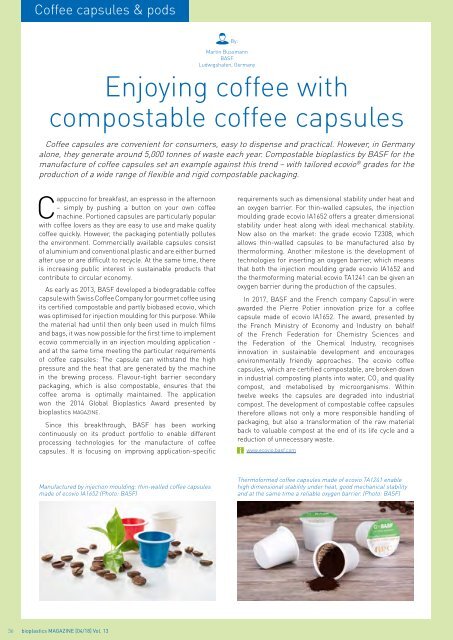Issue 04/2018
bioplasticsMAGAZINE_1804
bioplasticsMAGAZINE_1804
Create successful ePaper yourself
Turn your PDF publications into a flip-book with our unique Google optimized e-Paper software.
Coffee capsules & pods<br />
By:<br />
Martin Bussmann<br />
BASF<br />
Ludwigshafen, Germany<br />
Enjoying coffee with<br />
compostable coffee capsules<br />
Coffee capsules are convenient for consumers, easy to dispense and practical. However, in Germany<br />
alone, they generate around 5,000 tonnes of waste each year. Compostable bioplastics by BASF for the<br />
manufacture of coffee capsules set an example against this trend – with tailored ecovio ® grades for the<br />
production of a wide range of flexible and rigid compostable packaging.<br />
Cappuccino for breakfast, an espresso in the afternoon<br />
– simply by pushing a button on your own coffee<br />
machine. Portioned capsules are particularly popular<br />
with coffee lovers as they are easy to use and make quality<br />
coffee quickly. However, the packaging potentially pollutes<br />
the environment. Commercially available capsules consist<br />
of aluminium and conventional plastic and are either burned<br />
after use or are difficult to recycle. At the same time, there<br />
is increasing public interest in sustainable products that<br />
contribute to circular economy.<br />
As early as 2013, BASF developed a biodegradable coffee<br />
capsule with Swiss Coffee Company for gourmet coffee using<br />
its certified compostable and partly biobased ecovio, which<br />
was optimised for injection moulding for this purpose. While<br />
the material had until then only been used in mulch films<br />
and bags, it was now possible for the first time to implement<br />
ecovio commercially in an injection moulding application -<br />
and at the same time meeting the particular requirements<br />
of coffee capsules: The capsule can withstand the high<br />
pressure and the heat that are generated by the machine<br />
in the brewing process. Flavour-tight barrier secondary<br />
packaging, which is also compostable, ensures that the<br />
coffee aroma is optimally maintained. The application<br />
won the 2014 Global Bioplastics Award presented by<br />
bioplastics MAGAZINE.<br />
Since this breakthrough, BASF has been working<br />
continuously on its product portfolio to enable different<br />
processing technologies for the manufacture of coffee<br />
capsules. It is focusing on improving application-specific<br />
requirements such as dimensional stability under heat and<br />
an oxygen barrier. For thin-walled capsules, the injection<br />
moulding grade ecovio IA1652 offers a greater dimensional<br />
stability under heat along with ideal mechanical stability.<br />
Now also on the market: the grade ecovio T2308, which<br />
allows thin-walled capsules to be manufactured also by<br />
thermoforming. Another milestone is the development of<br />
technologies for inserting an oxygen barrier, which means<br />
that both the injection moulding grade ecovio IA1652 and<br />
the thermoforming material ecovio TA1241 can be given an<br />
oxygen barrier during the production of the capsules.<br />
In 2017, BASF and the French company Capsul’in were<br />
awarded the Pierre Potier innovation prize for a coffee<br />
capsule made of ecovio IA1652. The award, presented by<br />
the French Ministry of Economy and Industry on behalf<br />
of the French Federation for Chemistry Sciences and<br />
the Federation of the Chemical Industry, recognises<br />
innovation in sustainable development and encourages<br />
environmentally friendly approaches. The ecovio coffee<br />
capsules, which are certified compostable, are broken down<br />
in industrial composting plants into water, CO 2<br />
and quality<br />
compost, and metabolised by microorganisms. Within<br />
twelve weeks the capsules are degraded into industrial<br />
compost. The development of compostable coffee capsules<br />
therefore allows not only a more responsible handling of<br />
packaging, but also a transformation of the raw material<br />
back to valuable compost at the end of its life cycle and a<br />
reduction of unnecessary waste.<br />
www.ecovio.basf.com<br />
Manufactured by injection moulding: thin-walled coffee capsules<br />
made of ecovio IA1652 (Photo: BASF)<br />
Thermoformed coffee capsules made of ecovio TA1241 enable<br />
high dimensional stability under heat, good mechanical stability<br />
and at the same time a reliable oxygen barrier. (Photo: BASF)<br />
36 bioplastics MAGAZINE [<strong>04</strong>/18] Vol. 13


















